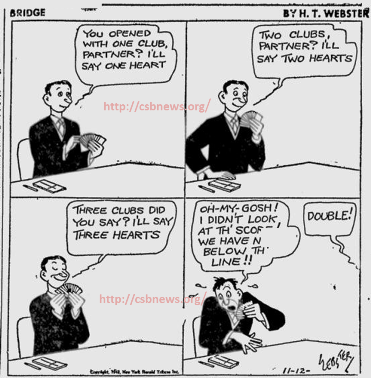Reading Eagle – 5 Feb 1931 by David Burnstine
A FUNNY case of a bridge comedy of errors occurred in a game I watched. One of the players was Col. Frank Cook, a noted expert and formerly managing editor of the Auction Bridge Magazine. The bidding of one hand went: Col. Cook, one no trump; the second player, pass; Cook’s partner, three no trump (it was Contract); the fourth player, pass. The colonel then calmly made the astonishing bid of 3 no trump.
The explanation is that Cook is somewhat hard of hearing and thought that his partner had bid only two no trump, whereupon he raised him to three, the game declaration. The third player, however, objected to this bid, saying it was against the rules. “But the colonel does not hear very well,” said the objector’s partner, but the other still insisted it was an improper bid.
Cook here spoke up saying: “He’s right. The game of bridge does not take physical infirmities into consideration?’ He then accepted the penalty of making his bid sufficient, as it is technically known which meant that his bid was raised to 4 no trump, one more than his partner had called.
The declarer then proceeded to take in eight tricks, ending in his own hand. The opponents had taken three tricks. The Dummy was left with two cards, the Ace and Queen of Diamonds. Cook now led a Diamond from his hand, but as he did so he forgot that he was playing for 4 no trump, and thinking that he only needed one more trick for his contract, refrained from finessing the Queen and played the Ace.
The third player held the King of Diamonds, but so sure was he Cook intended to finesse that he suffered the optical illusion of seeing the Queen played, and triumphantly threw his King on to of the Ace, thereby giving the colonel the needed 10th trick.
The amazement of both men, when each finally became aware what he had done, was a comical sight. The lapses of memory and sight are not unusual in bridge. Often players have so definite a picture in their minds of what they intend to do, or what they imagine another player will do, that momentarily they do not recognize that something quite different has been done.


